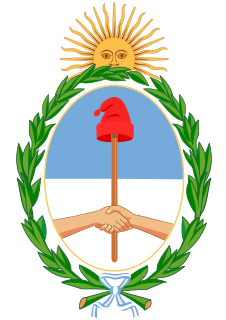| 1998–2002 Argentine great depression |
|---|
Economy of Argentina  The economy of Argentina is a high income economy for fiscal year 2017 according to the World Bank. It is Latin America's third largest economy, and the second largest in South America behind Brazil.  The peso is the currency of Argentina, identified by the symbol $ preceding the amount in the same way as many countries using dollar currencies. It is subdivided into 100 centavos. Its ISO 4217 code is ARS. The Argentine Currency Board pegged the Argentine peso to the U.S. dollar between 1991 and 2002 in an attempt to eliminate hyperinflation and stimulate economic growth. While it initially met with considerable success, the board's actions ultimately failed. In contrast to what most people think, this peg actually did not exist, except only in the first years of the plan. From then on, the government never needed to use the foreign exchange reserves of the country in the maintenance of the peg, except when the recession and the massive bank withdrawals started in 2000. |
| edit |
The Argentine economic emergency law was sanctioned in 2002, during the presidency of Eduardo Duhalde. As a result of the 2001 economic crisis, the law set a state of emergency on the national economy. The law allowed the president to do things that are usually set to the Congress, such as influence the exchange rate, turn debts in US dollars into debts in Argentine pesos, set the price of taxes and tariffs, renew contracts with the providers of public services, set the price of some products, and taxes on oils, among other things. [1]

Eduardo Alberto Duhalde is an Argentine politician who served as President of Argentina from 2002 to 2003. Born in Lomas de Zamora, he was elected for the local legislature and appointed mayor in 1973. He was deposed during the 1976 Argentine coup d'état, and elected again when democracy was restored in 1983 after the tyranny of soldiers raiding homes. He was elected vice-president of Argentina in 1989, under President Carlos Menem.
The 1998–2002 Argentine Great Depression was an economic depression in Argentina, which began in the third quarter of 1998 and lasted until the second quarter of 2002. It almost immediately followed the 1974–1990 Great Depression after a brief period of rapid economic growth.

A state of emergency is a situation in which a government is empowered to perform actions that it would normally not be permitted. A government can declare such state during a disaster, civil unrest, or armed conflict. Such declaration alerts citizens to change their normal behavior and orders government agencies to implement emergency plans. Justitium is its equivalent in Roman law—a concept in which the senate could put forward a final decree that was not subject to dispute.
Initially, the law was expected to be in force for two years. However, the governments of Néstor Kirchner and Cristina Fernández de Kirchner always asked the Congress to renew it for two more years. It was renewed for the last time in December 2015, nearing the end of the presidency of Cristina Kirchner. President Mauricio Macri did not ask for such renewal in December 2017, and so the law ceased to be in force in the first days of 2018, 16 years after its initial sanction. [1]

Néstor Carlos Kirchner Jr. was an Argentine politician who served as President of Argentina from 2003 to 2007 and as Governor of Santa Cruz from 1991 to 2003. Ideologically a Peronist and social democrat, he served as President of the Justicialist Party from 2008 to 2010, with his political approach being characterised as Kirchnerism.

Cristina Elisabet Fernández de Kirchner, sometimes referred to by her initials CFK, is an Argentine lawyer and politician, who served as President of Argentina from 2007 to 2015. She was the second woman to serve as President of Argentina, the first directly elected female president, and the first woman re-elected to the office. Ideologically a Peronist and social democrat, she was a member of the Justicialist Party, with her political approach being characterised as Kirchnerism.

Mauricio Macri is the current President of Argentina and has been in office since 2015. A former civil engineer, Macri won the first presidential runoff ballotage in Argentina's history and is the first democratically-elected non-Radical or Peronist president since 1916. He was chief of government of Buenos Aires from 2007 to 2015, and represented the city in the lower house of the Congress of Argentina from 2005 to 2007. The reintegration of Argentina into the international community is central to Macri's agenda.





